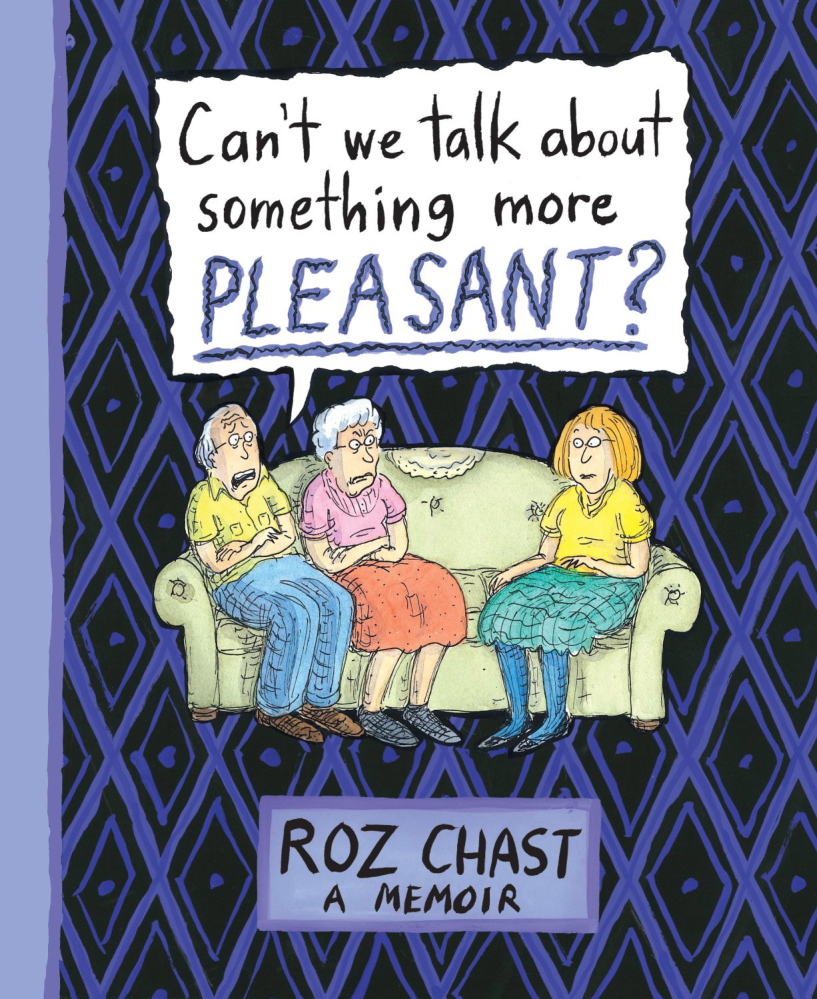Rejoice, devotees of Roz Chast, whose hilarious, of-the-moment cartoons have been appearing in The New Yorker since 1978. Chast’s first graphic memoir, “Can’t We Talk About Something More Pleasant?” is funny and smart, of course, but also bravely self-revealing and sad. Her quavering, scribbly ink line and her mordant prose formulations work on a profound new level in this book, which deserves a place beside Alison Bechdel’s much-awarded “Fun Home.”
Chast’s work as a cartoonist has always focused on the crazy-making dilemmas and absurdities of modern life, from the political to the personal. She has normalized hysteria and neurosis with her charts and graphs (“The Berlitz Guide to Parent-Teacher Conferences”) and single-panel revelations (“How to Drive Your Man Crazy in Bed”). Chast’s memoir takes on another zeitgeist-y topic: caring for aging parents.
The story unfolds over 18 chapters, using both cartoon panels and paragraphs of handwritten text. There also are scrapbook-style pages of family snapshots, typescripts of Chast’s mother’s rhyming poems, and photographs of the old shavers, eyeglasses and piles of paper left behind when the couple moved out of their Brooklyn apartment of 48 years.
Most powerfully, the book closes with a series of portraits Chast drew at her mother’s bedside in the last days of her life.
“It was against my parents’ principles to talk about death,” Chast explains in her introduction. Her mother’s dialogue balloon: “When you’re dead, you’ll know.”
Yet the final decline of George and Elizabeth Chast, beginning in their apartment and continuing in a Connecticut facility Chast calls “The Place,” played out over eight years and gave their only child plenty to talk about.
Chast left home for college at 16 and moved to Connecticut with her husband and son in 1990, when her parents were 78. In the following decade, she tells us, “I had not set foot in Brooklyn ONCE. Denial, avoidance, selfishness, laziness, and the day-to-day busyness of my life (two little kids! cartoon deadlines! grocery shopping!) were all partly to blame.”
But by 2001, her parents need her help – and Chast forces herself to rise to the challenge.
The story that spins out from there may not be pleasant, but it is certainly entertaining and bittersweet.
There are still wincing jokes to be made about the reprise of the family dynamic: Elizabeth, a bullying despot and former elementary assistant principal who is always ready to give “a blast from Chast”; George, her obedient and adoring subject; Roz, their miserable and overwhelmed attache, venting in her sketchbook.
But gradually, her parents’ health difficulties and the practical complications they create become less and less funny.
Her sweet, ineffectual father, George, dies not long after breaking his hip in 2007.
Up to the last minute, the blasts from Chast are coming fast and furious. “I told Daddy he was coming with me to 100 if I had to drag him KICKING AND SCREAMING!” Elizabeth bellows.
Chast’s unfailing self-awareness and black humor take the edge off the harsher aspects of this difficult story, but perhaps nothing is more touching than how much the cartoon Roz resembles the cartoon Elizabeth.
The truth of “Can We Talk About Something More Pleasant?” goes deeper than words.
Send questions/comments to the editors.



Comments are no longer available on this story